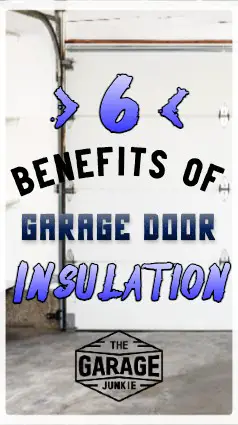Today we’re going to be exploring the wonderful world of garage door insulation! Sound riveting? Well, admittedly, maybe not. But insanely practical and interesting at least? I hope so because that’s what we’re going for!
So, I’m not sure about you, but this isn’t a topic that was on my radar until recently. In the last two homes I owned, I’m not even sure if the garage doors were insulated at all. (Correction – my wife just yelled from the other room that our first house had some polystyrene boards filling the panels. But that they were damaged and ugly. Now THAT I do remember!) So maybe this isn’t a newer thing, but as so many garage upgrades are being perfected over time, this one seemed worth looking into.
A friend of mine also brought up this topic when we were discussing projects that we were both doing around the house. He explained that he was putting vents in his garage to try to create some airflow in the Florida heat. But he was also installing garage door insulation since the hot summer sun was beating on the aluminum garage door for the better part of the day.
I have the same set up with my garage – the door faces west and gets the midday and evening sun (which is brutal out here in Arizona). The more I thought about it, the more I liked the idea of insulating the garage door and blocking some of the heat from entering the garage. But what were the benefits of garage door insulation? I checked out my own garage doo and did some research and here is what I found.
The benefits of insulating your garage door include dampening sound, lowering power bills, and providing better climate control during months with extreme temperatures. Insulating your garage door can be a beneficial upgrade to the look of your workspace, and best of all – it’s a quick project for the DIYer.

Benefit # 1 – Garage Door Insulation is Sound Dampening
Let’s be real-life in suburbia can get noisy. Your neighbor’s dog barking across the street is noisy. You raising and lowering the garage door in itself is noisy. On garbage day, that rumbling, creaking truck hauling off your trash is noisy. Those neighborhood kids speeding down the pavement on their scooters and bikes are crazy noisy. AND to your neighbors walking down the street or trying to sleep in on a Saturday, you working with your power tools is, well, also noisy.
So, if you want to work in your garage in peace, or not disturb others during those early weekend mornings or late nights working over the workbench, garage door insulation might be an excellent investment for you!
Most garage door insulation adds an additional inch or so barrier between the ruckus outside and you working away. This may not seem like much, but the polystyrene foam or the batt insulation are both sound dampeners that can reduce the ambient sound around your workspace.
Beyond just the ambient sound, insulating the garage door will quiet the door some when it is raised and lowered. It will reduce the sounds coming in from the outside. But most importantly, it will absorb and reduce the sound that would otherwise be reflected by the aluminum door and will quieten the room itself when you are working out in the garage.
Benefit # 2 – Garage Door Insulation Can Lower Power Bills
Looking to lower your energy bills? Adding garage door insulation might be an option to help assist this.
Now, adding garage door insulation (to an attached garage) will reduce heat transferring in and out of the garage during the more extreme seasons. But it can also have a secondary effect of lowering your power bills by reducing how much heat is transferring through the walls in and out of the garage to the house.
Much like adding additional insulation in your attic to create more of a barrier, or adding vents to allow heat to escape from the house attic, reducing the temperature of an attached garage will help reduce the energy needed to keep the house cool since there will be less heat transferring in or out of the house through the walls that separate the two areas.
If you are someone who spends a good deal of time in the garage, and you use either a fan, portable AC unit, heater, etc. to keep the temperature more comfortable, you might be wasting energy or fuel if your garage door in not insulated. Without having that additional barrier on your garage door, your garage door is not helping your cause of keeping the heat in or out depending on the season.
Benefit # 3 – Garage Door Insulation Gives You a Climate–Controlled Work and Storage Space
Out here in the desert, the temperature can be brutal during the summer months. I have a friend who is big into woodworking and building custom furniture. Because of the heat during the summer months, he chooses to close up shop for the summer. It is just simply too hot to work outside.
One of the benefits of garage door insulation is that it can extend the “season” of being able to work, project, or play in the garage. This will help keep heat in during the winter and keep the heat out in the hottest part of the day, in the winter.
Now, if you live in a place like I do during the summer months, or you live in an area where the winters can be brutal, you might need to assist your garage door insulation to keep the place comfortable to work in. You might want to consider a space heater to combat the brutal cold, or an AC unit for the garage to help climate control your work and storage space.
Benefit # 4 – Garage Door Insulation Makes a Better Place for Storage
Obviously, you need to be wise when you determine what you will store in your garage. You would not want box up your wife’s Christmas candles, or your grandma’s antique whatcha-ma-call-its (that are who knows how old but are sentimental and you’re not quite ready to part with them just yet . . .) But other more garage-y things can still be damaged if you live in a place with extreme temperatures. Left-over paint, for example, can dry out or separate if exposed to too much heat or cold. Or wood materials can warp or crack if exposed to moisture and then blistering temperatures over time.
Garage door insulation won’t guarantee perfect climate control. But it can help take some of the swing out of those highs and lows your garage can experience during the summer and winter months, depending on where you live. This means that things that might be in the “questionable” category, like certain chemicals, propane tanks, or even your Christmas decorations, can then be shelved with more confidence that you won’t have things leaking or damaged.
Benefit # 5 – Garage Door Insulation Can Upgrade the Look of Your Garage
If you are trying to make your garage a more workable and livable space, garage door insulation does not only have the benefit of making the space more functional, it can also give those blank panels a little more aesthetic appeal. But I will add, only if it’s done right.
Garage door insulation can give your garage door, and the garage itself, a more finished look. Garage door insulation kits, especially the polystyrene with the vinyl backer will make your garage look more professionally done.
If you have old garage door insulation that is cracked, without a backer or has portions missing altogether, a replacement insulation kit may be the better investment than trying to repair it piecemeal. Not only will it look better because the panels will be uniform, but the all-new insulation will also ensure that the transfer of heat or cold will stop at each section of the door.
If upgrading the look of your garage has become more important as of late, and you are considering an overhaul, check out our article on the topic, Where to Start with Garage Décor.
Benefit # 6 – Garage Door Insulation is a DIY- Friendly Project!
Garage door insulation is a project that is quick, simple, and can be tackled in a few hours.
If you can ever get away from the honey-do list, insulating the garage door got added to the honey-do list, or your garage might be the place you hide to avoid the list, insulating the garage door is a project nearly anyone can tackle (without the kicking and screaming). No matter how you found yourself at this point, do not worry.
You will need to purchase a kit and have a few tools on hand to get the job done. The wonderful thing is the tools and time required are minimal. You will need a straight edge (I.e. framing square), a tape measure, a utility knife, and some gloves. Check out our article on How to install garage door insulation.
Once you have the kit and the tools in place, tell your significant other that it is going to be a grueling and long process. You will not need to be checked on, but you might need to have a few buddies come over to “help”.
Final Thoughts
If you want to make your garage a place where you can work or store things year-round, insulating your garage door can be one of the easiest and most space-changing upgrades you can add to your garage. An insulated garage door has about 5x better thermal performance than a non-insulated garage door.
A garage door insulation project can be a simple DIY project that you can do on a weekend morning. It will probably take around an hour as you are getting a feel of measuring and inserting the material into the garage door.
There are a couple of different types of material, most of which come in a kit, for garage door insulation. If you are looking into this project, we suggest that you go with polystyrene with a vinyl back to provide a better finish once the project is complete. This type of insulation is probably one of the most forgiving since it has the vinyl protective layer.
**Final note: For those of you going the installation route, remember to check the balance of the door to ensure that your garage opener can handle the upgrade. The kits are not heavy, but the extra weight can alter the balance of the door. A professional would need to come and determine if new garage door springs are required to keep everything safe and running smoothly.
Thanks for reading, and as always, be sure to keep it tuned to The Garage Junkie for all of your garage’s FYI and DIY needs!
